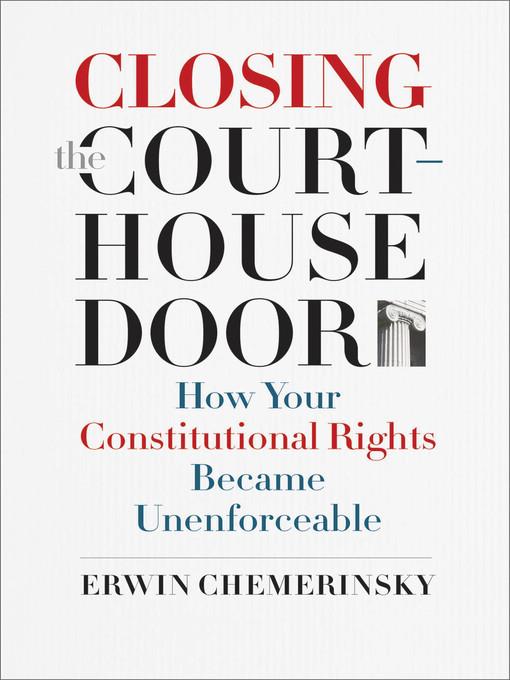
Closing the Courthouse Door
How Your Constitutional Rights Became Unenforceable
کتاب های مرتبط
- اطلاعات
- نقد و بررسی
- دیدگاه کاربران
نقد و بررسی

October 24, 2016
Supreme Court decisions such as Citizens United, which deal with substantive issues, have understandably garnered the most attention from nonlawyers, but law professor Chemerinsky (The Case Against the Supreme Court) demonstrates here that the Court’s procedural decisions are also vitally important. As he notes, “Court decisions rejecting rights get headlines, while rulings dismissing cases on... procedural grounds garner little attention.” The net effect, however, of such dismissals is to close “the federal courthouse doors to those whose rights have been violated.” The professor immediately makes this plain with the horrifying case of current and former female military personnel prevented from suing over sexual assaults they had suffered while in the service. A federal appellate court ruled that they had no legal remedy, because the U.S. government is completely immune from being sued in the absence of an authorizing statute and the Supreme Court has ruled that “people cannot sue others in the military.” Such examples of the deficient logic behind adherence to doctrines such as sovereign immunity, a relic of English law from the time of Edward I holding that the “King can do no wrong,” make this powerful and impassioned book anything but dry reading. Its cogent analysis is enhanced by practical steps for enabling federal courts to again truly enforce the U.S. Constitution.

Starred review from November 15, 2016
How conservative majorities in successive Supreme Courts have consistently acted in recent years to block citizens' access to redress of grievances through the courts.Chemerinsky (Law and Political Science/Univ. of California, Irvine School of Law; The Case Against the Supreme Court, 2014, etc.), who is on the National Jurist's list of the "Most Influential People in Legal Education," challenges anyone concerned with particular injustices to step back and examine the bigger picture. He charges that government, at all levels, has been made immune from suits for redress of grievances and wrongs whether brought by individuals or through class action. Throughout, he provides ample casebook evidence to support his arguments. The Supreme Courts chaired by William Rehnquist and John Roberts have both erected significant barriers to citizens attempting to bring suits, effectively turning government at the federal level into a parody of the monarchy it was created to replace. Doctrines of state sovereignty have been rolled out to block access to federal courts and constitutional redress, and judges, prosecutors, police, and prison staff have all been accorded immunity from those seeking redress. These immunities have been maintained in a variety of direct and indirect ways, including procedural maneuvers such as redefining how a plaintiff or plaintiffs can attain standing to proceed. Even the doctrine of habeas corpus has been hollowed out. Otherwise, the excuse of politics has been misused to dump court issues back onto the legislative branch. Furthermore, constitutional appeals have become almost impossible to make, much less win. In Chemerinsky's view, "the effect of the Supreme Court's decisions...is that the Republican Form of Government Clause is essentially read out of the Constitution." Widespread government surveillance is protected, and the court's political majority has eroded individuals' rights, even as it has transformed government. A dramatic challenge to understand the shakiness of the foundations we take for granted and where energies committed to redress should be directed.
COPYRIGHT(2016) Kirkus Reviews, ALL RIGHTS RESERVED.

























دیدگاه کاربران